This blog contains affiliate links. As part of afiiliate networks and as an Amazon Associate, I earn from qualifying purchases. If you make a purchase through these links, I may earn a small commission at no additional cost to you. I only recommend products and services that I believe in and have personally used or researched. Your support helps me continue to provide quality content—thank you!
You’re searching for the top ecology textbooks for students and researchers, and you’ve come to the right place! From thorough guides to concise introductions, we’ve ranked the top 10 ecology textbooks that cover key concepts, applications, and principles. Whether you’re looking for a thorough understanding of terrestrial or marine ecology, rest assured. Consider factors like complexity, content coverage, price, and durability when choosing the right textbook for your needs. As you explore the world of ecology, you’ll discover the intricate relationships between living organisms and their environments – and we’re just getting started.
Key Takeaways
- Ecology textbooks provide a comprehensive guide to understanding the natural world, covering energy and nutrient fluxes, nutrient cycling, and interconnectedness of organisms.
- Top-rated ecology textbooks include “Ecology: Concepts and Applications”, “Wildlife Ecology, Conservation, and Management”, and “Ecology Introduction”, each offering a unique perspective on ecology.
- When choosing an ecology textbook, consider the level of complexity and depth required, content coverage, price, and binding quality to ensure value for money.
- Key features of ecology textbooks include high-quality pages, colorful diagrams, and a loose-leaf format for easy carrying and learning.
- Ecology textbooks cater to various learners, from students to researchers, and are ideal for courses, self-study, and review for ECO Bio Tests.
Ecology
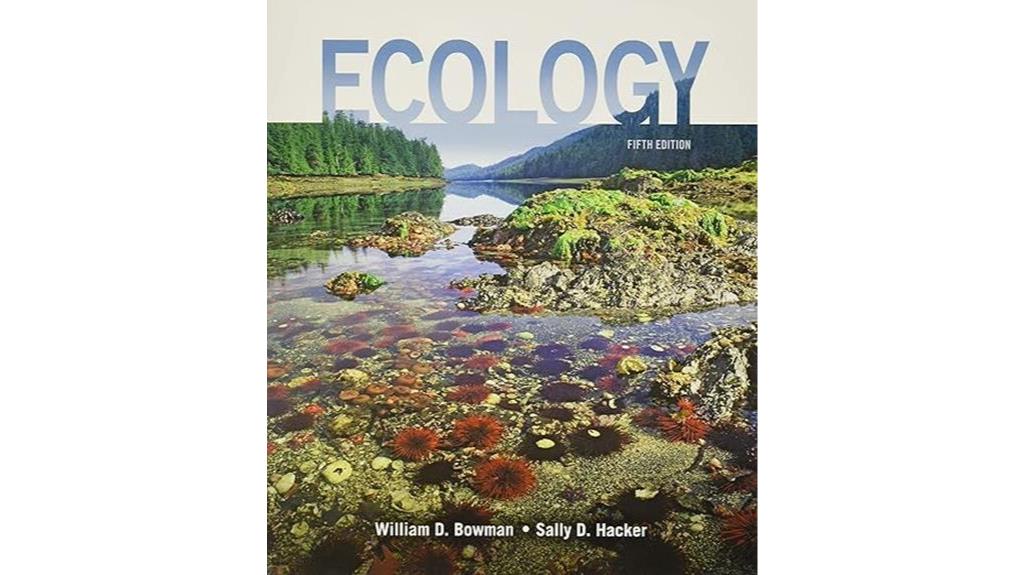
If you’re looking for a thorough guide to understanding the intricacies of the natural world, an ecology textbook is the best choice for you.
As you explore the world of ecology, you’ll discover the complex relationships between living organisms and their physical and chemical environments.
You’ll learn about the global ecological system of the biosphere, including energy and nutrient fluxes in living systems and the cycling of nutrients like carbon, nitrogen, phosphorus, and sulphur between living matter and the physical environment.
With an ecology textbook, you’ll gain a deeper understanding of the interconnectedness of organisms and life processes, and how they impact the natural world.
Best For: Students, researchers, and enthusiasts looking for a comprehensive guide to understanding ecology and the natural world.
Pros:
- Excellent quality and value for the price
- Provides a thorough and contemporary introduction to ecology concepts and principles
- Relevant and engaging examples and explanations to help readers understand complex ecological relationships
Cons:
- May contain minor flaws such as highlighter and pencil marks
- May not be readily available in local libraries or bookstores
- May require some prior knowledge of scientific concepts and terminology
Ecology
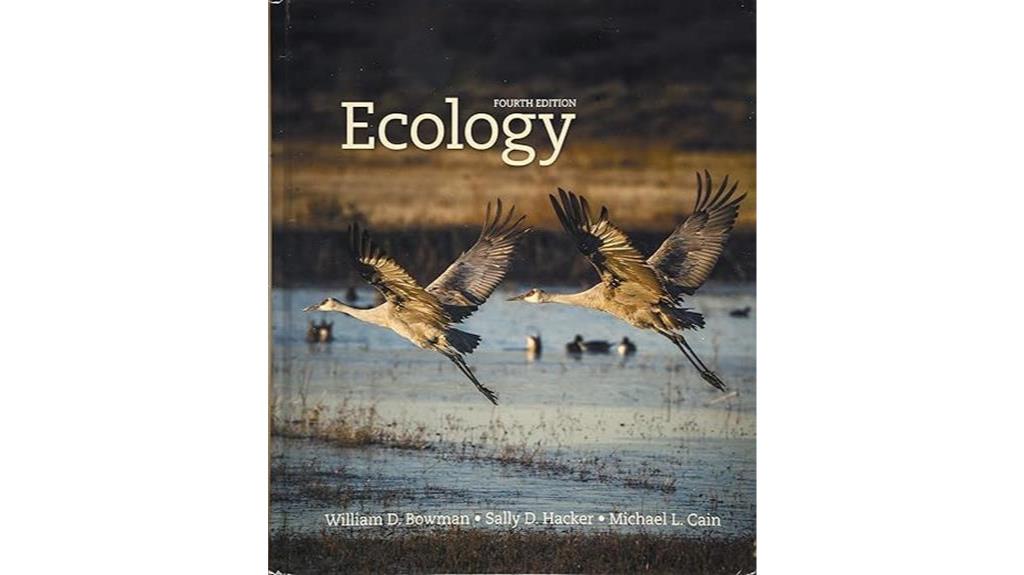
You’ll find the ecology textbooks to be an excellent choice for students and self-learners alike, particularly those who value a well-documented and visually engaging learning experience.
The textbooks arrive in excellent condition, with nice quality, clean, and smooth pages.
You’ll appreciate the great content, which provides lots of information, and the well-documented and colorful diagrams that cater to visual learners.
The loose-leaf format makes it easy to carry sections around, and the legible fonts and numerous diagrams enhance the learning experience.
Whether you’re a student required to use the textbook for a course or someone looking to review for ECO Bio Tests, these ecology textbooks are a great choice for academic use.
Best For: Students and self-learners who value a well-documented and visually engaging learning experience.
Pros:
- Great content that provides lots of information
- Well-documented and colorful diagrams that cater to visual learners
- Loose-leaf format makes it easy to carry sections around
Cons:
- Online access code in the book was invalid and did not work
- Loose-leaf format is cheaper to buy but harder to sell
- Hardcover version is more sturdy for rough handling
Ecology: Concepts and Applications
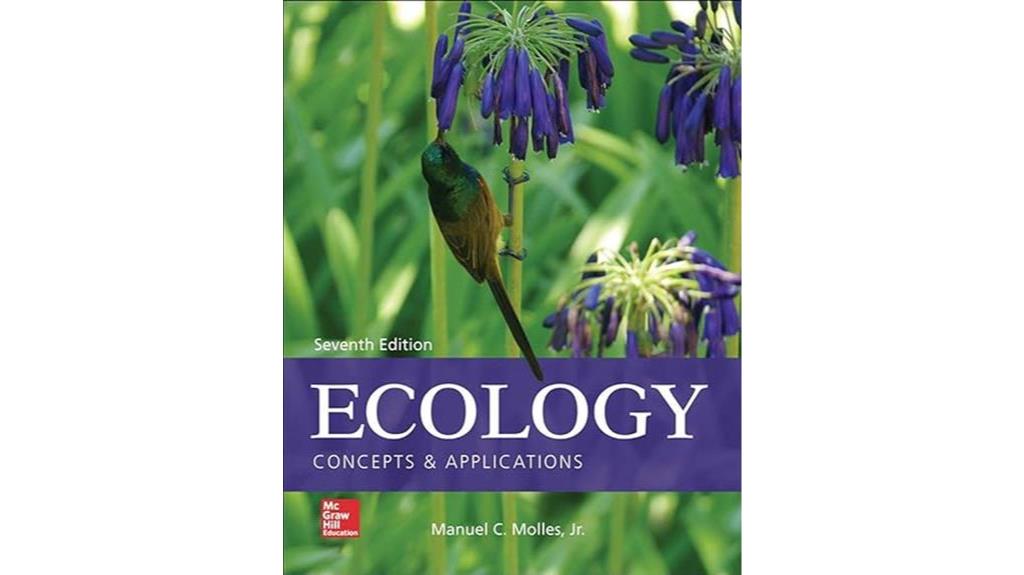
For students seeking a thorough ecology textbook that provides a complete understanding of key concepts and applications, ‘Ecology: Concepts and Applications’ is an excellent choice.
You’ll appreciate the wealth of information and experiment examples that provide real-life context to the concepts.
This well-written textbook offers a complete understanding of the subjects within, making it an ideal resource for your ecology class.
As a biology major, you’ll find it helps you grasp ecology concepts and make the best grade in the sciences.
Plus, it’s an excellent value, costing a fraction of the national version’s price.
With its durable binding, this textbook will last you throughout your academic journey.
Best For: Biology majors and students taking an ecology class who need a comprehensive and well-written textbook to help them understand key concepts and applications.
Pros:
- Provides a complete understanding of ecology concepts and applications with real-life examples and experiment examples
- Well-written and easy to understand, making it an ideal resource for students
- Durable binding ensures the textbook will last throughout the academic journey
Cons:
- Costs $100-200 in the school bookstore, although it can be purchased at a lower price
- No additional features or digital resources are mentioned
- No specific unique features are highlighted that distinguish it from other ecology textbooks
Wildlife Ecology, Conservation, and Management
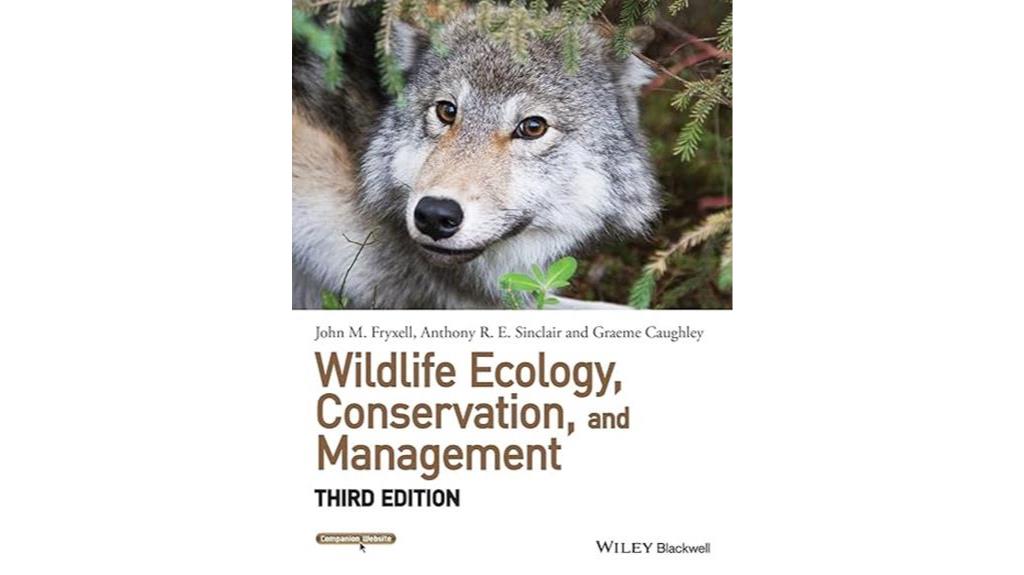
Wildlife Ecology, Conservation, and Management is the top pick for ecologists and students seeking a thorough guide that masterfully balances complex concepts with relatable examples.
You’ll appreciate how this textbook breaks down intricate ideas into easily digestible chunks, making it an excellent resource for both beginners and seasoned researchers.
The authors’ ability to present complex subjects in a simplistic manner has earned them rave reviews from PhD holders and students alike.
You’ll find plenty of examples to illustrate key concepts, although some users wish for more visual aids, like pictures, to supplement the text.
Despite some criticisms about the book’s layout and limited visual materials, its strengths far outweigh its weaknesses, making it an essential read for anyone serious about wildlife ecology and conservation.
Best For: Wildlife ecology and conservation students, researchers, and professionals seeking a comprehensive and accessible guide to the field.
Pros:
- Presents complex concepts in a simplistic and easy-to-understand manner
- Includes plenty of examples to illustrate key concepts
- Highly recommended by PhD holders and students alike
Cons:
- Limited visual aids, such as pictures and diagrams
- Charts and graphs are sometimes printed too small to read easily
- Some users find the book’s layout and organization to be confusing
Ecology
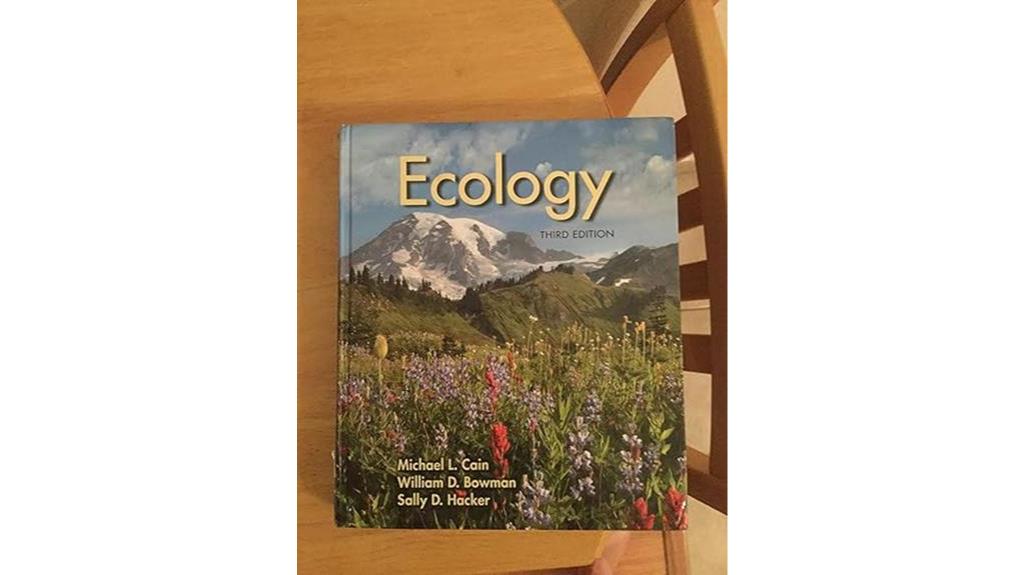
If you’re seeking a thorough and engaging introduction to ecology, this textbook is your perfect companion, offering a clear and concise overview of the subject with examples, graphs, and charts that make complex concepts easy to grasp.
You’ll appreciate how the authors define terminology as new terms are introduced, making it easy to understand and filling in any knowledge gaps you may have.
The exercises and review questions are informative and thought-provoking, making you think critically about the subject.
The colorful illustrations and engaging writing style make this textbook a great companion for your class lectures.
Overall, it’s a simplistic yet detailed and informative resource that will help you grasp the fundamentals of ecology.
Best For: Students seeking a comprehensive and engaging introduction to ecology.
Pros:
- Offers a comprehensive overview of ecology with examples, graphs, and charts that make complex concepts easy to grasp.
- Defines terminology as new terms are introduced, making it easy to understand and filling in knowledge gaps.
- Colorfully illustrated and engaging to read, making it a great companion for class lectures.
Cons:
- Loose-leaf edition arrives unbound and is difficult to store, with binders being too big and clunky.
- Loose-leaf edition is not worth the cost savings, and other editions (hardcover or paperback) are recommended instead.
- Paperback edition is actually a loose-leaf textbook, available for less than half the price elsewhere.
Ecology & Population Biology Self-Teaching Guide
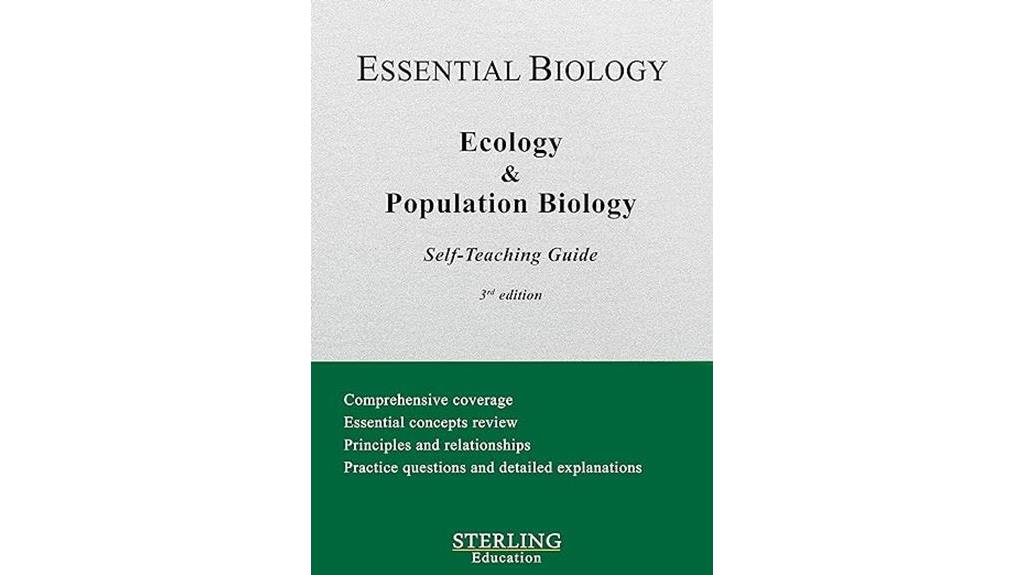
When you need a thorough guide to master ecology and population biology, the ‘Ecology & Population Biology Self-Teaching Guide’ stands out as the best choice.
You’ll find it’s highly recommended for anyone interested in biology or needing it for a class.
The book’s quality is incomparable for its price – it’s incredibly well-defined and a pleasure to read.
With very good definitions that are essential for biology, you’ll find it’s a valuable resource.
Plus, you can’t beat the price – it’s a great value for your money.
Whether you’re a student or researcher, this self-teaching guide is perfect for you.
Best For: Students or researchers interested in biology or needing a comprehensive guide for a class.
Pros:
- Highly recommended for anyone interested in biology or needing it for a class
- Incomparable quality for the price, with incredibly well-defined content and a pleasure to read
- Great value for money with essential definitions for biology
Cons:
- None mentioned
Ecology: The Economy of Nature
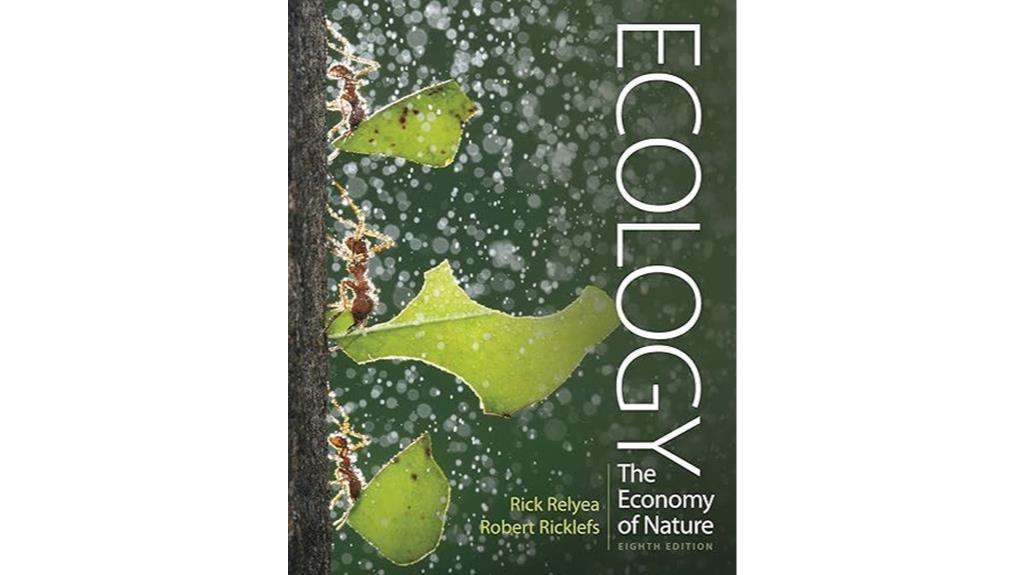
Ecology: The Economy of Nature is the best choice for students and educators seeking a concise and easy-to-follow guide to understanding the complexities of ecology.
With its clearly written and illustrated overviews of major ecological concepts and principles, it provides an excellent resource for learning.
The book includes excellent examples of current discoveries and research that make the concepts more relatable.
However, if you’re planning to get the e-book version, be aware that some users have reported issues with the Kindle version, including missing pages, navigation problems, and difficulties with the table of contents.
On the other hand, the paperback version seems to be a better option, but be prepared to pay extra for Sapling access, which isn’t included with the book purchase.
Best For: Students and educators seeking a concise and easy-to-follow guide to understanding the complexities of ecology.
Pros:
- Clearly written and illustrated overviews of major ecological concepts and principles
- Excellent examples of current discoveries and research
- Really concise and easy to follow!
Cons:
- Issues with the Kindle version, including missing pages, navigation problems, and difficulties with the table of contents
- Sapling access code not included with book purchase, costs extra
- Publishers’ response to queries can be curt and dismissive
Principles of Terrestrial Ecosystem Ecology
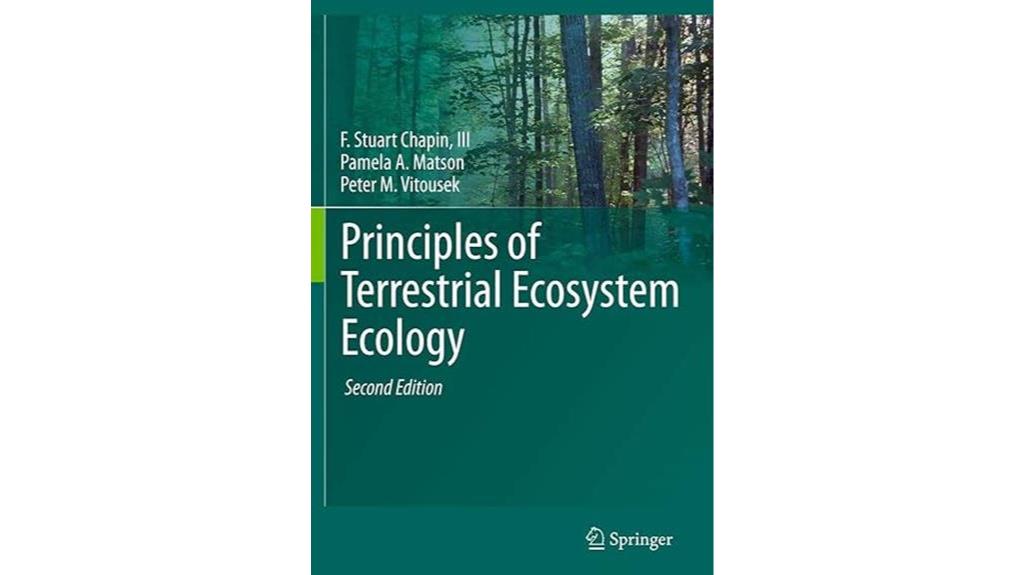
Students of ecosystem ecology courses will highly benefit from this excellent textbook, which provides a superb amount and quality of information on terrestrial ecosystem ecology.
You’ll find the text clear and easy to read, making it perfect for your studies. The book is well-organized, and the format is easy to follow, with follow-up questions at the end of each chapter to test your knowledge.
The index, bibliography, references, and illustrations provide an intense depth of knowledge.
You’ll appreciate the up-to-date information on terrestrial ecosystem ecology, making it a great resource for your research or studies.
Overall, it’s an excellent textbook that’s well worth having a physical copy of, and it’s no surprise it’s a required text for some classes.
Best For: Students of ecosystem ecology courses, researchers, and individuals interested in terrestrial ecosystem ecology.
Pros:
- Provides a superb amount and quality of information on terrestrial ecosystem ecology
- Well-organized and easy to follow, with follow-up questions at the end of each chapter to test knowledge
- Up-to-date information and excellent resource for research or studies
Cons:
- Some users received damaged or defective copies with printing errors or torn covers
- No specific cons mentioned regarding the content or accuracy of the book
- No other negative aspects mentioned besides issues with book condition
Marine Ecology: Processes, Systems, and Impacts
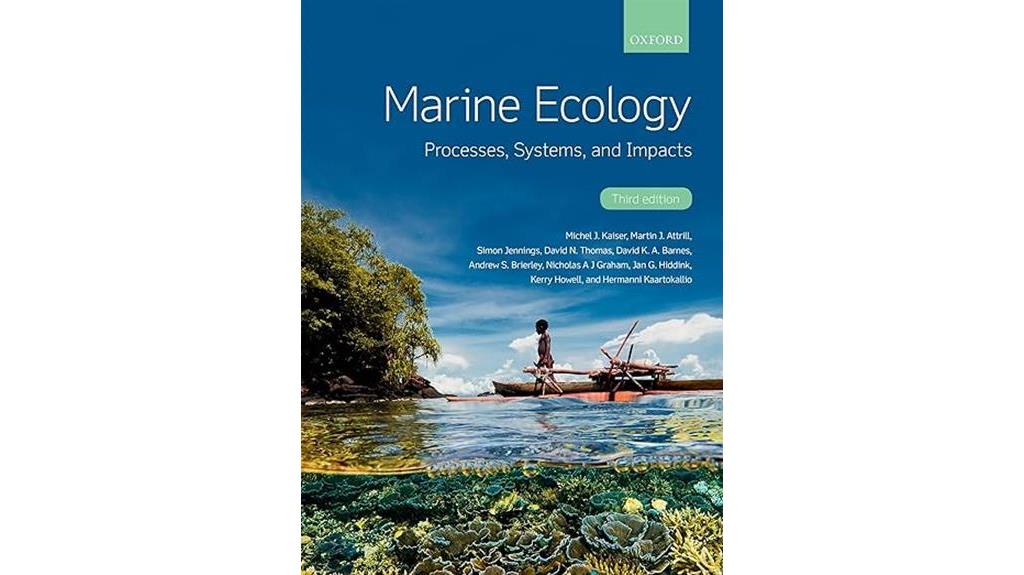
This textbook is ideal for advanced undergraduates and introductory postgraduate students seeking a thorough overview of marine ecology.
It stands out with its engaging insights into shorelines, polar caps, coral reefs, and abysmal depths. You’ll appreciate the recent scientific information and hundreds of illustrations and photos that make complex concepts easy to grasp.
The book is great for teaching and provides a solid overview of marine ecology and conservation. To get the most out of it, start by reading the chapter summaries, then delve into the contents and grab the intriguing facts.
While some users had issues with damaged books and poor customer service, the book’s content and support materials make it a valuable resource for your marine ecology studies.
Best For: Advanced undergraduates and introductory postgraduate students seeking a thorough overview of marine ecology.
Pros:
- Engaging insights into shorelines, polar caps, coral reefs, and abysmal depths
- Recent scientific information and hundreds of illustrations and photos that make complex concepts easy to grasp
- Great for teaching and provides a solid overview of marine ecology and conservation
Cons:
- Some users received damaged books despite paying for new ones
- Poor packaging and shipping by Amazon led to damaged covers
- Frustrating experience with customer service, including ineffective robot chat and unhelpful call backs
Essentials of Ecology
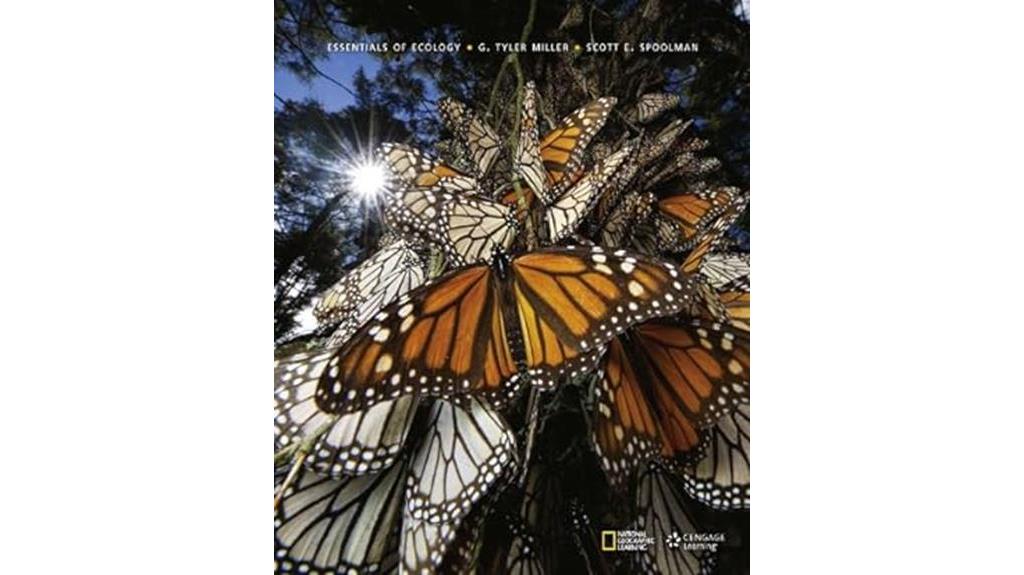
You’ll want to explore ‘Essentials of Ecology‘ if you need a clear and concise introduction to environmental science, focusing on human connection with the natural world.
This book provides a great starting point for understanding the basics of ecology, with writing that’s clear and non-technical.
You’ll appreciate the interesting graphs and charts that help illustrate key concepts.
However, keep in mind that this book doesn’t explore deeply into certain ecological topics, such as evolution and predator-prey relations.
If you’re looking for a thorough ecology textbook, this mightn’t be the best choice.
But if you need a solid intro to environmental science, ‘Essentials of Ecology’ is a great option.
Best For: Students looking for a clear and concise introduction to environmental science and ecology.
Pros:
- Clear and non-technical writing
- Interesting graphs and charts that help illustrate key concepts
- Good starting point for understanding the basics of ecology
Cons:
- Lacks in-depth coverage of key ecological topics, such as evolution and predator-prey relations
- Not a good choice for a thorough ecology course due to abbreviated content
- Has lots of highlighting throughout the book
Factors to Consider When Choosing Ecology Textbooks
When choosing an ecology textbook, you’ll want to evaluate several key factors to guarantee you get the right one for your needs.
You’ll need to ponder the book’s condition and quality, as well as whether it meets your academic or research requirements.
Additionally, you’ll want to examine the content coverage, price, and durability to verify you’re getting the best value for your money.
Book Condition and Quality
Considering the significant impact of a textbook’s condition on its overall quality, carefully evaluating the state of a used ecology textbook before making a purchase is vital.
You don’t want to end up with a book that’s barely usable due to highlighting, creased pages, or printing errors. On the other hand, a new ecology textbook in excellent condition can be a worthwhile investment, especially if it’s a required text for a course or has long-term relevance to the field of ecology.
When buying used, verifying the seller’s return and refund policies in case you receive a damaged or defective book is necessary.
You should also inspect the binding quality, as loose-leaf editions can be more prone to damage than hardcover or paperback editions. To confirm you get what you pay for, read reviews and check the seller’s ratings before making a purchase.
This will give you a better idea of the book’s condition and whether it’s worth the investment. By being diligent in your search, you can find a high-quality ecology textbook that meets your needs and budget.
Academic and Research Needs
To guarantee the ecology textbook meets your academic and research needs, identify the specific topics and areas of focus required for your course or project.
Are you looking for an in-depth introduction to ecology or do you need a more specialized text focusing on a particular aspect, such as conservation biology or ecosystem ecology?
Consider the level of complexity and depth you need. Are you a beginner or an advanced researcher?
Do you need a textbook that provides a broad overview or one that explores specific topics in greater detail?
You should also think about the type of learning resources you need.
Do you prefer textbooks with case studies, examples, and illustrations, or do you need a more theoretical approach?
Are you looking for a textbook that provides practical exercises, quizzes, or online resources to supplement your learning?
Knowing what you need will help you narrow down your options and choose a textbook that aligns with your academic and research goals.
Content Coverage and Depth
You’ll want to select an ecology textbook that provides in-depth coverage of fundamental concepts and explores the intricacies of ecosystem ecology.
This means the textbook should examine thoroughly the physical and chemical environment, energy and nutrient fluxes, and the cycling of nutrients between living matter and the physical environment.
A good ecology textbook should also analyze the global ecological system of the biosphere, including invariant concentrations of oxygen and nitrogen in the atmosphere and the salinity of ocean waters.
In addition, the textbook should cover key concepts in population biology, such as population growth, demography, and the principles of evolution.
You’ll also want a textbook that applies ecological principles to real-world problems, like conservation, management, and sustainability.
By choosing a textbook that covers these essential topics, you’ll gain a thorough understanding of ecology and be better equipped to tackle complex environmental issues.
Price and Value for Money
When evaluating ecology textbooks, it’s not just about the content – the price tag also plays a significant role in your decision-making process.
You need to weigh whether the cost of the textbook is justified by the quality of the content. A cheaper option might seem appealing, but it may compromise on the depth of information or the accuracy of the data.
On the other hand, a more expensive textbook might provide better value for money if it offers in-depth coverage of the subject, includes high-quality illustrations, and is written by experts in the field.
It’s also worth contemplating alternative formats, such as loose-leaf editions, which can be a cost-effective option.
However, you should think about their durability and resale value before making a purchase.
Ultimately, the cost of a textbook should be evaluated in the context of its relevance to the course curriculum and its potential to enhance the learning experience.
Binding and Durability
Consider the binding and durability of an ecology textbook, as a well-bound edition can withstand heavy use and last longer than a loose-leaf version.
When choosing an ecology textbook, you’ll want to ponder the binding quality, as it can affect the book’s overall durability. A bound edition is often a better option than a loose-leaf text in a binder, as it’s less prone to page loss or disorganization.
If you prefer a more durable option, ponder a hardcover edition, which is often sturdier than a paperback. However, keep in mind that hardcover editions may be heavier and more expensive.
Digital formats are also available, which can be more convenient and lightweight, but may not be suitable for students who prefer to annotate their texts.
Whatever format you choose, make sure to inspect the binding quality to verify it can withstand heavy use. A high-quality binding will last longer than a low-quality one, making it a worthwhile investment for your ecology studies.

Erzsebet Frey (Eli Frey) is an ecologist and online entrepreneur with a Master of Science in Ecology from the University of Belgrade. Originally from Serbia, she has lived in Sri Lanka since 2017. Eli has worked internationally in countries like Oman, Brazil, Germany, and Sri Lanka. In 2018, she expanded into SEO and blogging, completing courses from UC Davis and Edinburgh. Eli has founded multiple websites focused on biology, ecology, environmental science, sustainable and simple living, and outdoor activities. She enjoys creating nature and simple living videos on YouTube and participates in speleology, diving, and hiking.
🌿 Explore the Wild Side!
Discover eBooks, guides, templates and stylish wildlife-themed T-shirts, notebooks, scrunchies, bandanas, and tote bags. Perfect for nature lovers and wildlife enthusiasts!
Visit My Shop →
